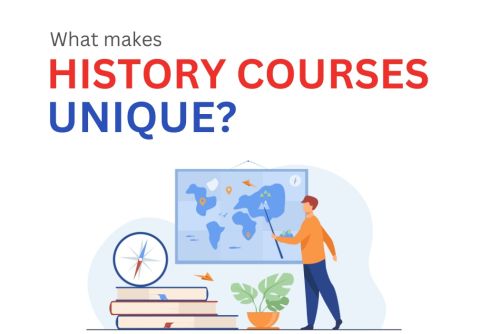
What Makes History Courses Unique?

History frequently occupies a unique place in the ever-expanding field of academic subjects. Memorizing who did what and when isn't enough, nor is it merely a collection of dates and old documents. The ability of history courses to foster critical thinking, connect the past and present, and provide comprehensive understandings of society and human behavior is what really sets them apart.
History is by its very nature narrative-driven, in contrast to many other academic topics that place an emphasis on procedures or ideas. Real narratives are what it's about. These are the stories of empires coming and going, revolutions bringing about change, and people influencing the globe in both significant and little ways. In addition to learning these stories, history classes require students to examine who told them, how and why, and what was excluded.
Studying history is both challenging and distinctively enriching because of its dual nature of fact and interpretation.
Science frequently looks for definitive solutions. In contrast, history grows in inconsistencies. What caused a war to start? Was a revolution unavoidable? Was it possible to prevent a crisis? History offers frameworks for understanding rather than definitive solutions. Instead of merely listing causes and outcomes, students learn to interpret them.
Students are able to comprehend current events from a more complex, less reactive standpoint because of this emphasis on context. This is a talent that is becoming more and more important in a world full of ideas and information.
History classes are not about rote memorization, despite popular belief. Rather, they urge students to assess arguments, identify prejudice, and analyze sources. It takes more than memory to evaluate a primary source from centuries ago and contrast it with a contemporary story; it needs judgment.
Students studying history learn from asking challenging queries, such as: Who gains from this account of events? What is absent? What is the source's motivation?
History does not exist in an empty space. It incorporates ideas from literature, sociology, politics, economics, religion, and even science. Studying weather reports to comprehend historical droughts or interpreting religious texts to understand medieval civilization are two possible outcomes of taking a history course.
History is both vast and integrative due to its multidisciplinary character. It enables a more comprehensive view of human culture and creates links between seemingly unrelated topics.
Students are forced to think about lives and perspectives that are very different from their own as they study history. It challenges students to imagine themselves as soldiers in World War I, activists in 19th-century Britain, or peasants in ancient Japan. This creative leap cultivates empathy, a quality that is becoming more and more important.
By doing this, history fosters the growth of global citizens who are able to accept and cherish many cultures, viewpoints, and beliefs.
The fact that history classes never really focus only on the past is arguably the most convincing argument for their distinctiveness. Every historical research reflects the issues of the day. Historical injustices, colonial legacies, and monument debates all demonstrate how significantly history still influences modern identities and politics.
History classes are therefore never only about the past; rather, they are about comprehending the present and envisioning the future.
Heres a Guide on How to Make the Most of Your Placement Year
History courses are unique in that they are not only intellectual efforts, but also human ones. They teach us how to question, connect, and care. In an age of quick information and transitory trends, history provides something unique: perspective.
So, if you're seeking for a course that sharpens your thinking, broadens your outlook, and connects you more closely to the world around you, history might be the topic for you.